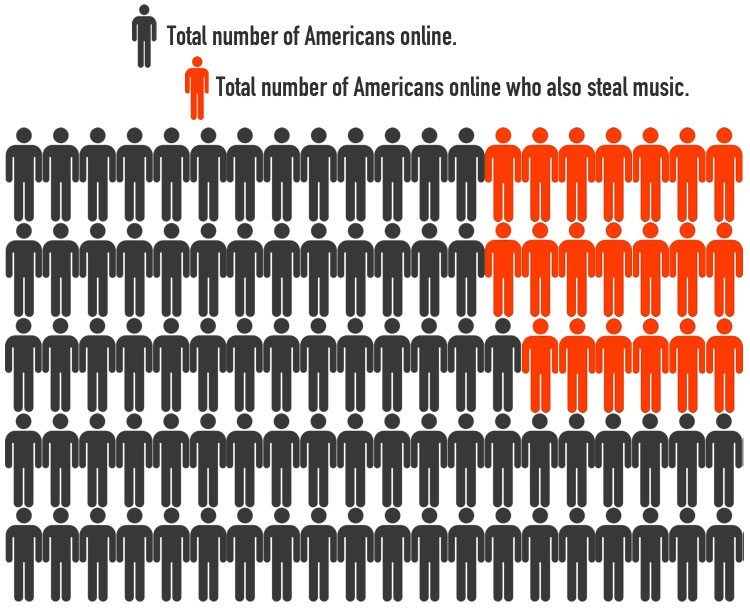by Paul Resnikoff
Streaming music killed piracy, right? Wrong, according to MusicWatch, the latest research group to point to increasing music piracy levels.
Last year, Digital Music News pointed to data showing massive increases in BitTorrent piracy between 2010 and 2014, despite heavy rhetoric to the contrary.  Now, another research group is daring to challenge the status quo, specifically with a report showing a massive 57 million Americans accessing illegal music in 2015.
The data, published this week by MusicWatch, tracks a widening range of illegal access channels, including BitTorrent, storage lockers, illegal streaming apps, ‘streamripping,’ P2P, and even hard drive swaps.  That broad-based methodology was critical for understanding the level of illegal acquisition, and unearthed a surprisingly stubborn group of music fans.  “Acquisition of unlicensed music from unsanctioned sources has not gone away,†MusicWatch chief researcher Russ Crupnick affirmed to Digital Music News.  “[‘Piracy is dying’] is an entirely incorrect proclamation.â€
+Is Your Music Being Pirated? Find Out And Do Something About It!
Crupnick commissioned a study specifically on illegal acquisition, with participants self-identified as stealing music across seven different platforms.  In total, the MusicWatch estimated that 57 million Americans are routinely accessing at least one of these sources for music, oftentimes without realizing the platform is illegal.
That’s about 20 percent, or 1 in 5, of the roughly 280 million Americans currently online.
But Crupnick stumbled upon another interesting statistic.  The survey results also revealed that 35 percent of Americans who buy music legitimately have also acquired music illegally at some point.  “Another startling statistic: 35% of music buyers (CD or download) also reported getting at least one song from an unsanctioned source,†Crupnick shared.  “This is not exclusively a problem among people unwilling to pay for music.â€
+Advertise With Digital Music News
Stunning stuff, though it gets exponentially more horrifying deeper down the rabbit hole.  That includes the confusing reality that those stealing music are also better music consumers overall. And, die-hard music fans areoftentimes on both sides of the fence.  Supporting that discovery was another strange stat: Americans that regularly steal music spend an average of $33 annually on either CDs or paid downloads.  That is substantially higher than the average per-capita music spend of $19 in the US, though substantially below the $43 per capita figure for average music buyers.
Even more hair-brained was the discovery that music pirates are oftentimes on streaming services as well, often with paid services like Spotify Premium.
‘Streamripping’
Crupnick also tracked emerging forms of piracy, particularly ‘streamripping,’ or the simple conversion of streams (typically from YouTube) into downloads.  That basic activity has ballooned in recent years, perhaps driven by the explosion of YouTube itself.  “Speaking of streamripping, we estimated a 50% increase in the number of streamrippers in the US between the end of 2013 and early 2015,†Crupnick continued.
“There are nearly as many streamrippers in the US as folks who illegally download music files from P2P networks.â€
‘The Kanye Effect’
The study closely follows a piracy surge around Kanye West’s latest album, ‘The Life of Pablo’.  That album was deliberately restricted to the smaller streaming service Tidal, and excluded from leading platforms Spotify and Apple Music.  The result was an explosion in BitTorrent file-trading on Pablo, with downloads quickly passing the half-million mark while topping Pirate Bay’s charts.
‘Ownership Still Matters’
Crupnick attributed that to a simple availability problem, but only once piece of the bigger piracy puzzle. Â Indeed, the study findings pointed to continued interest in music ownership, especially among music fans that wanted offline access on their smartphones. Â That, of course, is readily available from services like Spotify, but users still remain unwilling to pay.
Perhaps there’s a deeper attachment to ownership here.  “The migration to access was supposed to eliminate the need (and desire) for owning music,†Crupnick relayed.  “But consumers disagree… some expressed concerns about data usage but ownership is a higher priority.  This is not surprising as our other studies point to continued perceived value in possessing a song or album.â€



















